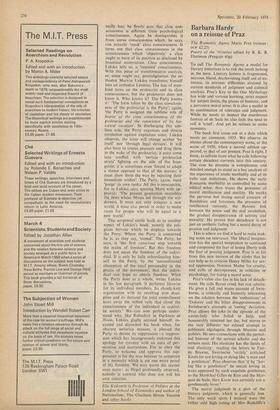Barbara Hardy on a reissue of Praz
Poetry of the 'Nineties edited by R. K. R. Thornton (Penguin 40p) To call The Romantic Agony a model for literary historians is to risk the insult lurking in the term. Literary history is fragmented, nervous, bland, deathwishing itself out of ex- istence, its intrinsic difficulties strained by current standards of judgment and cultural analysis. Praz's Key to the One Mythology has wide and various learning, strict respect for subject limits, the graces of humour, and a pervasive moral sense. It is also a model in its combination of tolerance and judgment. While he needs to inspect the murderous fantasy of de Sade he also feels the need to call it 'cruel'. And yet he refuses to make monsters.
The book first came out at a date which needs no comment, 1933. We observe its silence about the contemporary scene, or the scene of 1950, when a second edition ap- peared, or that of our present. Praz is right, I think, to refrain from what he calls following certain decadent currents into this century. The case he presents is conspicuous and detailed enough to stand as a key analysis of the experience of erotic morbidity and of its cults and imitations. He shows the early Romantic morbidity as controlled by some 'ethical sense, then traces the processes of moral sterilisation and sterility. He marks the perverse but strong moral concern of Baudelaire and Satanism, the pressures of intellectual curiosity, the Byronic link between the poem and the real revolution, the gradual disappearance of activity and morality. He proves that decadence is not just an aesthetic fading but a moral decay of passion and judgment.
This is where we find it hard to resist mak- ing notes on relevance. The liberal imagina- tion has the special temptation to confound and compound the fear of losing liberty with the fear of passing judgment. Praz is so far from this new treason of the clerks that he can help us to criticise Henry Miller for sex- ual oppression, Norman Mailer for cruelty, and cults of derangement, in criticism or psychology, for losing a moral sense.
Praz's value also lies in his lack of detach- ment. He calls Byron cruel, but can admire.
He gives a full and warm account of Swin- burne, is critically and humanly interesting on the relation between the 'enthusiasm' of 'Dolores' and the bitter disappointments in Swinburne's attempts at 'curing' deviation. Praz allows the joke in the episode of the circus-lady who failed to help, and honourably returned her fee, but moves to the very different but related attempt to sublimate algolagnia through Mazzini and politics. He sees connections with the permit- ted humour of the serious scholar and the serious man. His elasticity has the limits of real elasticity : reading the letters to Fan- ny Brawne, Swinburne `virilely' criticised Keats for not loving or dying like 'a man and a gentleman'. Praz observes that 'if by "lov- ing like a gentleman" he meant loving in ways approved by such exquisite gentlemen as the Mardchal Gilles de Rais and the Mar- quis de Sade, then Keats was certainly not a gentlemanly lover.'
The moral judgment is a part of the literary judgment, which is generally fine. The only weak spots I noticed were the rather odd high rating of Mrs Radcfiffe's horrors (surely weak beside the sensuality of Maturin and Monk Lewis?) and the rather cursory comments on Richardson and Pater. But these are tiny details in an admirable whole. Let me pick out his comments on Emma Bovary's depravity, Wilde's damag- ingly constant revelation of his sources, and Dostoievsky's extension of sado-masochism to the soul and mind. One of the sources of insight, literary and otherwise, is his sense of the mental dimension of the erotic.
Romantic agonies are conspicuously absent in the new anthology Poetry of the 'Nineties, which might have been designed to show what Praz calls the sterility of decadent imitation. The editor rightly wants to show the 'nineties poetry as larger than the 'nineties myth, but also more or less admits that this is far from easy. What is lacking in much of thiS poetry is the passional ex- perience, and the lack is the more marked because of the imitation of subject. Here are the themes of form, decoration and ma- quillage, religious masochism, city squalor, and the fin de siecle, but the French transla- tions only make sadly lucid the quality of unfelt fashionable imitation. Like Henley's barmaid, most of this 'shadows cheaply the mode'. Most crucial, I thought, was the absence of any sign, either in the verse, or in the editorial commentary, that there was a connection between perverted artificiality and the moral sense of the fin de siecle. No glimpse of what Barbey d'Aurevilly calls 'tale race a sa derniere heure, only a wistful melancholy. Apart from Yeats, Hardy, bits of Housman, Johnson and Dowson, who may write bad poetry, but know what a poem is, most of these poems turn a blank face to I. A. Richards's timely question, 'How does a poem know when it is finished?' Poetry, says Richards, must be activity, 'When we fall downstairs that is not activity; going up them is'. When you turn from Shelley and Baudelaire to Wratislaw and Richard Le Gallienne you know exactly what he means by falling downstairs.
Barbara Hardy is Professor of English ' Literature at Birk heck College and author of a forthcoming study of Thackeray



































 Previous page
Previous page